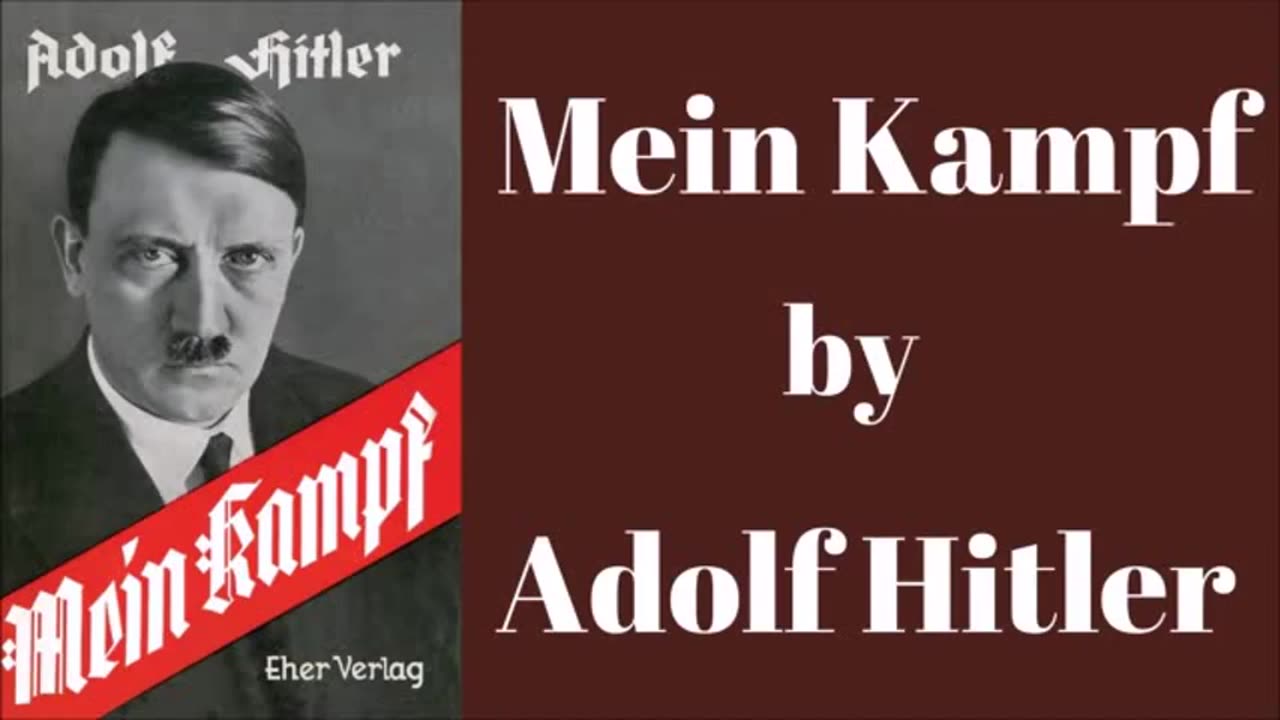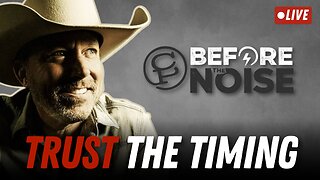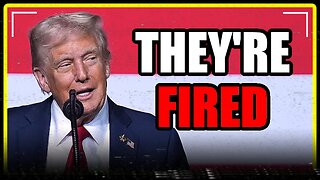Premium Only Content

Mein Kampf ~Adolf Hitler
We are long overdue for a revisionist treatment of this work. In my experience, very few people really understand what’s in it. The common man, even the well-educated one, likely knows little more than the title and the author. Revisionists who work on the Holocaust or either of the world wars often bypass the book completely, as if it had no relevance at all; most likely, they have never read it. Traditional journalists, academics, and alleged experts frequently display their ignorance by taking passages out of context, overlooking key facts, or simply failing to cite the author appropriately. More generally, the mainstream approach to Mein Kampf seems be rather similar to its tactics with regard to Holocaust revisionism: ignore, censor, or disparage. It is simply too problematic to discuss this work in a fashion that might lead readers to ask tough questions, or to seek out the book itself.
A large part of the reason for the book’s obscurity is the sorry state of its many English translations. These will be discussed and critiqued below. This is also one of the reasons that I am currently working on a new, parallel German-English translation—the first ever, in fact. I will attempt to remedy many of the shortcomings in current versions, and provide something of a revisionist perspective on the entire work. In the present essay, I examine the translations, discuss some main themes of the book, and argue for its relevance in the present day.
A Most Consequential Work
Mein Kampf is the autobiography and articulated worldview of one of the most consequential and visionary leaders in world history. It is also one of the most maligned and misrepresented texts of the 20th century. There have been so many obfuscations, deceptions, and outright falsehoods circulated about this work that one scarcely knows where to begin. Nonetheless, the time has come to set the story straight.
That Adolf Hitler would even have undertaken such a work is most fortunate. Being neither a formal academic nor a natural writer, and being fully preoccupied with pragmatic matters of party-building, he might never have begun such a major task—were it not for the luxury of a year-long jail term. In one of the many ironies of Hitler’s life, it took just such an adverse event to prompt him to dictate his party’s early history and his own life story. This would become Volume One of his two-part, 700-page magnum opus. It would have a dramatic effect on world history, and initiate a chain of events that has yet to fully play out. In this sense, Mein Kampf is as relevant today as when it was first written.
Perhaps the place to begin is with the rationale for the book. Why did Hitler write it at all? Clearly it was not a requirement; many major politicians in history have come and gone without leaving a personal written record. Even his time in prison could have been spent communicating with party leaders, building support, soliciting allies, and so on. But he chose to spend much of his stay documenting the origins and growth of his new movement. And this was a boon to history as well as to understanding of the human spirit.
The work at hand seems to have served at least four purposes for its author. First, it is autobiographical. This aspect consumes most of the first two chapters, and is repeatedly woven into the remainder of Volume One. For those curious about the first 35 years of Hitler’s life, this aspect is invaluable. It gives an accurate and relevant account of his upbringing, his education, and the early development of his worldview. Like any good autobiography, it provides an irreplaceable first-hand description of a life. But as well, it offers the usual temptation to cast events in a flattering light, to downplay shortcomings, or to bypass inconvenient episodes. On this count, Hitler fares well; he provides an honest and open life story, devoid of known fabrications or omissions—one that is essential for understanding his thinking and attitudes on social, economic, and political matters.
Second, Mein Kampf is a kind of history lesson on Europe around the turn of the 20th century. Hitler was a proximate observer—and often first-hand witness—to many of the major events of the time. He served in the trenches of World War One for more than four years, which was virtually the entire duration of the war. Serving on the ‘losing’ side, he naturally gives a different interpretation of events than is commonly portrayed by historians of the victorious nations. But this fact should be welcomed by any impartial observer, and in itself makes the book worth reading. With rare exceptions—such as Jünger’s Storm of Steel—no other non-fiction contemporary German source of this time is readily available in English. For those interested in the Great War and its immediate aftermath, this book is irreplaceable.
In its third aspect, the book serves to document the origins and basic features of Hitler’s worldview. This, unsurprisingly, is the most distorted part of the book, in standard Western versions. Here we find the insights and trigger events that led a young man without formal higher education to develop a strikingly visionary, expansive, and forward-looking ideology. Hitler’s primary concern, as we read, was the future and well-being of the German people—all Germans, regardless of the political unit in which they lived. The German people, or Volk, were, he believed, a single ethnicity with unique and singular self-interests. They were—indisputably—responsible for many of the greatest achievements in Western history. They were among the leading lights in music, literature, architecture, science, and technology. They were great warriors, and great nation-builders. They were, in large part, the driving force behind Western civilization itself. Hitler was justly proud of his heritage. Equally is he outraged at the indignities suffered by this great people in then-recent decades—culminating in the disastrous humiliation of World War I and the Treaty of Versailles. He seeks, above all, to remedy these injustices and restore the mantle of greatness to the German people. To do this, he needs to identify both their primary opponents and the defective political ideologies and structures that bind them. Then he undertakes to outline a new socio-political system that can carry them forward to a higher and rightful destiny.
Finally, in its fourth aspect, Mein Kampf is a kind of blueprint for action. It describes the evolution and aims of National Socialism and the NSDAP, or Nazi Party, in compelling detail. Hitler naturally wants his new movement to succeed in assuming power in Germany and in a future German Reich. But this is no theoretical analysis. Hitler is nothing if not pragmatic. He has concrete goals and specific means of achieving them. He has nothing but disdain for the geistige Waffen, the intellectual weapons, of the impotent intelligentsia. He demands results, and success.
Importantly, his analysis is, in large part, independent of context. It does not pertain only to Germans, or only to the circumstances of the mid-1920s. It is a broadly universal approach based on the conditions of the modern world, and on human nature. As such, Hitler’s analysis of action is relevant and useful for many people today—for all those who might strive for national greatness in body and spirit.
This complex textual structure of Mein Kampf explains some of the complaints of modern-day critics who decry Hitler’s lack of ‘coherence’ or ‘narrative flow.’ He has many objectives here, and in their implementation, many points overlap. Perhaps he should have written four books, not one. Perhaps. But Hitler was a doer, not a writer. We must accept this fact, take what we have, and do our best to understand it in an open and objective fashion. He was not striving for a best-selling novel. He wanted to document history and advance a movement, and to these ends he succeeded most admirably.
Origins and Context
Born on 20 April 1889 in present-day Austria, Hitler grew up as a citizen of the multi-ethnic state known as the Austro-Hungarian Empire. This disparate amalgamation was formed in 1867, with the union of the Austrian and Hungarian monarchies; thus does Hitler refer to the state as the “Dual Monarchy.” Throughout its 50-year history, it was always a loose conjunction of many ethnicities, and never a truly unified state. The ethnic Germans in it were a minority, and had to struggle to promote their own interests. This fact caused Hitler no end of distress; he explicitly felt more attachment to the broader German Volk than to the multi-ethnic state into which he was born.
As a youth, his interests tended toward the arts, painting, and history. This led to conflict with his obstinate father, who envisioned a safe, comfortable bureaucratic career for his son. But his father’s death on 3 January 1903, when Adolf was 13, allowed the young man to determine his own future. Two years later he moved to Vienna, scraping by with menial jobs to survive. In late 1907, his mother died. At the age of 18, he then applied to enter the Viennese Arts Academy in painting, but was diverted to architecture. He worked and studied for two more years, eventually becoming skilled enough to work full-time as a draftsman and painter of watercolors.
All the while, he studied the mass of humanity around him. He read the various writings and publications of the political parties. He observed the workings of the press. He watched how unions functioned. He sat in on Parliament. He followed events in neighboring Germany. And he became intrigued by the comings and goings of one particular minority in Vienna: the Jews.
Gradually he became convinced that the two dominant threats to German well-being were Marxism—a Jewish form of communism—and the international-capitalist Jews. The problems were compounded by the fundamentally inept workings of a representative democracy that tried to serve diverse ethnicities. In the end, the fine and noble concept of democracy became nothing other than a “Jewish democracy,” working for the best interests of Jews instead of Austrians or Germans.
Upon turning 23 in 1912, Hitler went to Munich. It was his first extended contact with German culture, and he found it invigorating. He lived there for two years, until the outbreak of World War I in July 1914. Thrilled at the opportunity to defend the German homeland, he enlisted, serving on the Western front in Belgium. After more than 2 years of service, he was slightly wounded in October 1916 and sent back to Germany, spending some time in a reserve battalion in Munich. Appalled at both the role of Jews there and the negative public attitude, he returned to the front in March 1917.
By this time, the war had been dragging on for some two and a half years. It had effectively become a stalemate. Even the looming entrance of the Americans into the war—President Wilson would call for war the next month, and US troops would soon follow—would have little near-term effect. As Hitler explains, however, the Germans actually had reasons for optimism by late 1917. The Central Powers (primarily Germany and Austria-Hungary) had inflicted a decisive defeat on Italy in the Battle of Caporetto, and the Russians had pulled out of the war after the Bolshevik Revolution, thus freeing up German troops for the Western front. Hitler recalls that his compatriots “looked forward with confidence” to the spring of 1918, when they anticipated final victory.
-
 LIVE
LIVE
Matt Kohrs
10 hours agoROCKETING TO NEW HIGHS 🚀🚀🚀 (Stock Market Open) || Live Trading Futures & Options
586 watching -
 LIVE
LIVE
Wendy Bell Radio
4 hours agoDemocrats Are Getting CLOBBERED
7,419 watching -
 LIVE
LIVE
LFA TV
4 hours agoLIVE & BREAKING NEWS! | THURSDAY 10/2/25
4,613 watching -
 UPCOMING
UPCOMING
Chad Prather
13 hours agoWhen God Delays: Trusting Jesus in the Waiting Room of Life
24.7K6 -
 LIVE
LIVE
The Chris Salcedo Show
13 hours ago $6.91 earnedThe Democrat's Schumer Shutdown
607 watching -
 30:32
30:32
Game On!
17 hours ago $2.90 earned20,000 Rumble Followers! Thursday Night Football 49ers vs Rams Preview!
26.5K3 -
 1:26
1:26
WildCreatures
14 days ago $3.26 earnedCow fearlessly grazes in crocodile-infested wetland
29.3K3 -
 29:54
29:54
DeVory Darkins
1 day ago $16.82 earnedHegseth drops explosive speech as Democrats painfully meltdown over Trump truth social post
76.3K78 -
 19:39
19:39
James Klüg
1 day agoAnti-Trump Protesters Threaten To Pepper Spray Me For Trying To Have Conversations
41.3K27 -
 34:54
34:54
MattMorseTV
15 hours ago $30.22 earned🔴Trump just FIRED 154,000 FEDERAL WORKERS. 🔴
91.2K111